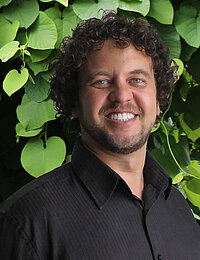
Research Scientist
Biology Cluster
Musicality and Bioacoustics
Email: Ebano.ResendedeSouza(at)oeaw.ac.at
Scientific ID:
https://orcid.org/0000-0001-9952-3642
Academic Background
Ébano Resende graduated with a Bachelor's degree in History at the Universidade Federal de Juiz de Fora (UFJF) in Brazil (2007) and with a Bachelor's degree in Music and Musicology at the Université Paris Sorbonne - Paris IV (2011). Afterwards he accomplished his Master's degree in Theory and Practice of Language and Arts - Music at the École des Hautes Études en Sciences Sociales (EHESS) in Paris (2013) and his PhD in Music, History, Society at the Université de Recherche Paris Sciences et Lettres (PSL/EHESS) (2018). In 2015 he was awarded the Prix d’Acoustique Musicale (Acoustics) with his work entitled “Absolute Pitch – Studies and Prospects” (L’Oreille Absolue: perspectives et enjeux sociaux - Le cas des étudiants du Conservatoire Supérieur de Musique de Paris) at the Conservatoire National de Musique et Danse de Paris (CNSMDP) under the direction of Adrien Mamou-Mani (IRCAM/CNSMDP) and Michèle Castellengo (Laboratoire d'Acoustique Musicale – LAM).
In 2022 he was invited by the Acoustics Research Institute (ARI) of the OeAW as an Incoming Fellowship. In 2023 he received the “Seal of Excellence” from the European Commission – Horizon Europe (Marie Skłodowska Curie Actions - MSCA) for the research project entitled “Is absolute (perfect) pitch a hinderance for musical ability?”. In May 2024 he moved to Vienna and started to work as a postdoctoral researcher at the ARI of the OeAW joining the Musicality and Bioacoustics group headed by Dr Marisa Hoeschele.
Current Research
Ébano Resende is interested in absolute pitch, the rare human ability to name notes without an external referant (e.g, "that note is an F#!"). While absolute pitch is commonly thought of as a sign of a virtuouso musician, during his time working as a music teacher, Ébano noticed that musicians with absolute pitch tended to have problems with some aspects of musical understanding and also a loss of pleasure derived from music. Ébano's project aims to formally explore this phenomenon. In particular, Ébano is interested in the so-called non-global absolute pitch possessors that have absolute pitch only in some contexts not others (e.g., only for piano notes, but not other instruments). He wants to understand the differences in musical appreciation and understanding among people with different levels of absolute pitch to understand the benefits and drawbacks of this phenomenon. The results of this project will have implications for the music education system including what aspects of musical abilities are important in the admission tests for music institutions.